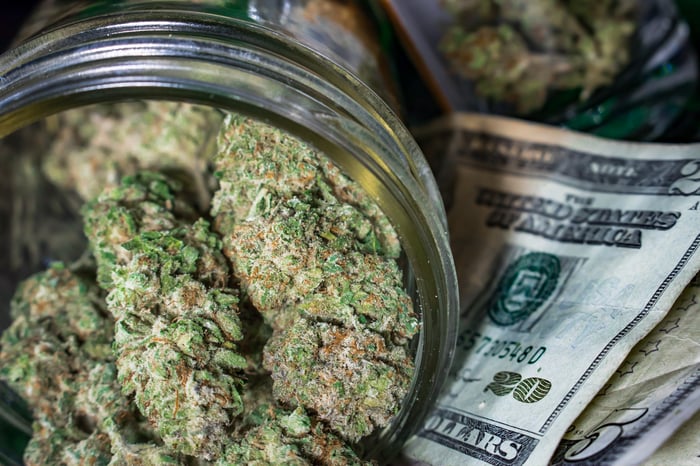The official launch date of recreational marijuana in Canada is drawing closer. In just two months and four days (Oct. 17, for those of you who hate math), it'll be legal for adults aged 18 or 19, depending on the province, to legally buy marijuana.
By opening the floodgates, up to $5 billion in annual revenue is expected to be generated by the cannabis industry. Mind you, this will come atop what the industry has already been bringing in via domestic medical cannabis sales and exports to foreign countries where medical marijuana is legal. Needless to say, expectations are high that the marijuana stocks will soon be seeing green.

Image source: Getty Images.
There's more to marijuana investing than just growers
But what Wall Street professionals and retail investors may be overlooking is the sheer depth of the marijuana industry. In other words, it's about far more than just growers. There's a massive amount of direct and indirect infrastructure that's supporting the rollout of recreational weed in our neighbor to the north, and each facet of the direct and behind-the-scenes industry could be a source of strong growth in the years that lie ahead.
For example, posh dispensary chain MedMen Enterprises (MMNFF) offers investors a unique way to take advantage of the cannabis craze in the United States. MedMen has 13 open stores at the moment spanning three states (California, Nevada, and New York), and three more are in development in Nevada. By 2020, MedMen anticipates having 50 locations.
Investors can also take advantage of the strict packaging, marketing, and branding guidelines associated with retail products by considering California-based Kush Bottles. Canada's regulatory agency laid out very specific guidelines that retailers and growers would need to follow in order to get pot products on dispensary shelves. Kush Bottles is expected to provide those packaging and branding solutions for a number of Canadian growers. Plus, its recently closed acquisition of Summit Innovations puts it in the driver's seat as a supplier of hydrocarbon gases (used for cannabis oil production) and solvents (used for concentrates).
Or, investors could choose a high-growth, cloud-based software-as-a-service (SaaS) giant like Shopify (SHOP 0.23%). And no, that's not a typo. I really did just say Shopify.

Image source: Getty Images.
Shopify could be an under-the-radar cannabis giant
You may know large-cap SaaS kingpin Shopify as the company that connects retailers (especially those with online sales platforms) with their suppliers and consumers. Soon, the Canadian marijuana industry in Canada will operate the same way. This means cloud-based platforms like Shopify's that connect the vertical cannabis supply chain to consumers will be invaluable going forward.
And make no mistake about it: Shopify has already landed its fair share of contracts.
In February, the Ontario Liquor Control Board announced that it was partnering with Shopify to use its e-commerce platform for brick-and-mortar, online, and mobile sales within the province. In Ontario, the government controls the stores responsible for dispensing cannabis.
Then, in June, Shopify inked a deal with British Columbia to offer similar services, albeit with private retailers in the mix. Shopify's platform will act as sort of a middleman to manage orders, execute those orders quickly, and anticipate consumer needs following legalization. Of course, with British Columbia having private retailers, it'll have to engage with each individual grower or retailer, whereas it'll be part of all of Ontario's government-run retail locations.
Shopify has also hooked up with no shortage of licensed producers. Canopy Growth Corporation (CGC 1.28%), Aurora Cannabis (ACB -1.15%), and Hydropothecary Corporation have all previously formed online deals with Shopify. This is particularly noteworthy given that Canopy Growth and Aurora Cannabis are expected to be the top two in terms of pecking order by production. Canopy Growth expects to eventually have 5.6 million square feet of growing capacity, while Aurora Cannabis's newly completed acquisition of MedReleaf puts it on track for 570,000 kilograms of peak annual production.

Image source: Getty Images.
On Thursday, Aug. 9, The Green Organic Dutchman (TGOD.F -23.08%), which sits fourth in terms of peak annual production, also inked an e-commerce deal with Shopify. When operating at full capacity, The Green Organic Dutchman is expected to yield 195,000 kilograms per year. Specifically, the company plans to use Shopify as the point-of-sale system in Epican Medicinals' retail outlets in Jamaica. Epican is a partner of The Green Organic Dutchman.
Keep this in mind
While it might come as a surprise to investors that Shopify could give them access to the fast-growing marijuana industry, it's important to understand that it could take some time before it's considered a needle mover for Shopify.
This year alone, Wall Street expects the company will increase its sales by nearly 53% to more than $1 billion, with sales pushing beyond $1.4 billion in 2019. It's undeniable the role that Shopify's e-commerce platform is playing in a multitude of industries -- not just marijuana. In essence, when evaluating Shopify as a potential investment, it may not be the best idea to place too much weight on its cannabis deals just yet. But at the rate the company has been landing contracts to our north, the legal marijuana industry has an opportunity to become a viable needle mover by as early as 2019 or 2020.





